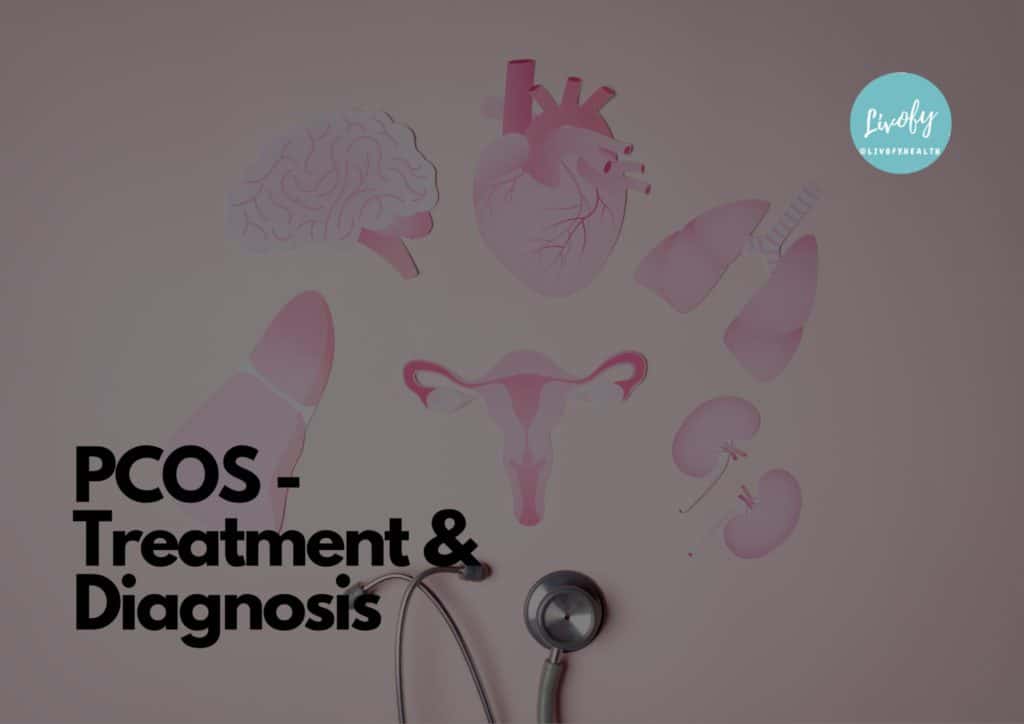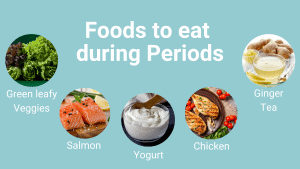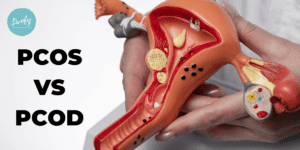Polycystic ovary syndrome (PCOS) is a common hormonal disorder that affects women of reproductive age. It is characterized by a combination of symptoms including irregular menstrual periods, high levels of androgens (male hormones), and polycystic ovaries (ovaries with multiple small cysts). In this blog, we will discuss about PCOS Meaning & Causes.
How is PCOS Diagnosed?
PCOS is typically diagnosed through a combination of physical examination, medical history, and laboratory tests. There are no specific lab tests to diagnose PCOS, but certain lab results can support the PCOS diagnosis. The diagnostic criteria for PCOS include:
- Irregular menstrual periods: Women with PCOS often have infrequent or prolonged menstrual periods, or may not have periods at all.
- Elevated androgen levels: PCOS is characterized by high levels of androgens, such as testosterone, which can lead to symptoms such as acne and hirsutism (excessive hair growth).
- Polycystic ovaries: PCOS is often associated with the presence of multiple small cysts on the ovaries, which can be detected through ultrasound imaging.
- Clinical or biochemical signs of hyperandrogenism.
A PCOS diagnosis may be made if a woman has two of the above criteria, including one of the first two. A pelvic ultrasound may also be done to check for cysts on the ovaries, however, it’s not a diagnostic criterion.
It is important to note that other conditions, such as thyroid disorders or congenital adrenal hyperplasia, can also cause symptoms similar to those of PCOS. Therefore, it is important to rule out other possible causes before making a PCOS diagnosis. Get enough idea about PCOS Meaning & Causes.
Treatment of PCOS
The PCOS treatment (PCOS problem treatment) depends on the individual woman’s symptoms and goals. Some common options include:
- Lifestyle changes: Losing weight, eating a healthy PCOS Diet Plan, and getting regular exercise can help to regulate menstrual periods, improve insulin sensitivity, and reduce symptoms such as hirsutism and acne.
- Medications: There are several PCOS medication that can be used to treat PCOS, including birth control pills to regulate menstrual periods, metformin to improve insulin sensitivity, and medications such as spironolactone or finasteride to reduce hirsutism.
- Ovulation induction: For women who are trying to conceive, PCOS medication such as clomiphene citrate or letrozole can be used to stimulate ovulation.
- Assisted reproductive technologies: For women who are unable to conceive with ovulation induction alone, assisted reproductive technologies such as in vitro fertilization (IVF) may be necessary.
- Surgery: Surgery can be an option for women with PCOS who have not responded to other PCOS problem treatment. Ovarian drilling, which uses a laser or electrical current to create small holes in the ovaries, can help to regulate ovulation and reduce androgen levels.
It is important to note that PCOS treatment should be individualized to the specific woman and her needs. Regular follow-up with a healthcare provider is necessary to adjust PCOS treatment as needed.
Diet & Lifestyle Tips to treat PCOS
Diet and lifestyle changes can be an important part of managing PCOS symptoms. Some tips that may be helpful include:
- Maintaining a healthy weight: Being overweight or obese can worsen PCOS symptoms, so it is important to try to achieve and maintain a healthy weight through a combination of diet and exercise.
- Eating a balanced diet: A diet with PCOS Recipes high in fruits, vegetables, whole grains, and lean proteins can help to improve insulin sensitivity and regulate blood sugar levels. Avoiding processed foods and added sugars can also be beneficial in our PCOS Blogs.
- Managing stress: Stress can worsen PCOS symptoms, so it’s important to find ways to manage stress through activities such as yoga, meditation, or regular exercise.
- Getting enough sleep: Aim for 7-8 hours of sleep per night and avoid staying up too late
- Avoiding smoking and alcohol consumption
- Incorporating high-intensity interval training (HIIT) or resistance training (RT) in your exercise routine, as can improve insulin sensitivity, weight loss, and androgen levels.
When should I see a Doctor for PCOS?
It is important to see a healthcare provider if you have symptoms that suggest you may have PCOS, such as irregular menstrual periods, excessive hair growth, acne, or difficulty conceiving. Some women with PCOS may also have other symptoms such as obesity, insulin resistance, or depression.
If you have any of these symptoms, it is important to see a healthcare provider for an evaluation. They will take a detailed medical history, perform a physical examination, and may order laboratory tests or imaging studies to help make a PCOS diagnosis
It is also important to see a healthcare provider regularly to monitor your symptoms and any potential complications associated with PCOS. This can include regular check-ins to monitor menstrual cycles, blood sugar levels, blood pressure, and cholesterol levels. If you are trying to conceive, it is important to see a healthcare provider early on to discuss PCOS treatment options and to monitor your progress.
It’s also important to see a healthcare provider if you are experiencing any unusual symptoms like severe pelvic pain, unusual vaginal bleeding, or sudden changes in vision. These symptoms may indicate a complication of PCOS such as ovarian torsion or endometrial hyperplasia.
Pregnancy & PCOS
Pregnancy and PCOS are two conditions that are closely related. PCOS is a hormonal disorder that affects women of reproductive age and is characterized by the presence of multiple cysts on the ovaries. The exact cause of PCOS is not known, but it is believed to be related to an imbalance of hormones such as testosterone and insulin.
One of the most significant effects of PCOS is that it can make it difficult for women to become pregnant. This is because the hormonal imbalances associated with PCOS can disrupt ovulation, making it harder for eggs to be released from the ovaries.
However, it is not impossible for women with PCOS to become pregnant. In fact, many women with PCOS are able to conceive with the help of fertility and PCOS problem treatment such as ovulation induction or in vitro fertilization (IVF).
There are also lifestyle changes that can help women with PCOS improve their chances of becoming pregnant. These include losing weight, getting regular exercise, and managing stress. Additionally, some women with PCOS may benefit from PCOS medication such as metformin, which can help regulate insulin levels and promote ovulation.
It’s important for women with PCOS to work closely with their healthcare provider to manage their condition and plan for pregnancy and PCOS. This may include regular check-ups and monitoring of hormone levels, as well as the use of pregnancy and PCOS Treatment, PCOS cure, and PCOS treatment for unmarried women if necessary.
Overall, while PCOS can make it more difficult for women to become pregnant, it is not impossible. With the right Pregnancy and PCOS treatment, PCOS cure and lifestyle changes, many women with PCOS are able to conceive and have healthy pregnancies.
The Bottom Line
In conclusion, PCOS is a common hormonal disorder that affects women of reproductive age, characterized by the presence of multiple small cysts on the ovaries, high levels of androgens, and irregular menstrual cycles. It can make it difficult for women to conceive, but with proper PCOS symptoms and treatment, many women with PCOS are able to become pregnant. PCOS treatment options or PCOS cure include PCOS medication to regulate ovulation, lifestyle changes, and in some cases, assisted reproductive technologies. It’s important for women who suspect they have PCOS to consult with a healthcare provider to get a proper PCOS diagnosis and PCOS problem treatment plan.
FAQs
How can I cure PCOS Naturally?
There are several home remedies for PCOS that may help manage the symptoms and improve fertility. Here are a few things you can try:
- Diet and exercise: Maintaining a healthy weight through a balanced diet and regular exercise can help regulate insulin levels and reduce symptoms such as hirsutism and acne.
- Herbs: Some herbs, such as chaste berry and saw palmetto, may help regulate hormones and improve ovulation.
- Supplements: Certain supplements, such as omega-3 fatty acids, myoinositol, and chromium picolinate, may also help manage PCOS symptoms.
- Stress management: Stress can exacerbate PCOS symptoms, so it’s important to find ways to manage stress, such as through yoga, meditation, or regular exercise.
- Acupuncture: Acupuncture may help regulate hormones, improve ovulation, and reduce PCOS symptoms and treatment or PCOS cure such as pain and fatigue.
What is the Best Treatment for PCOS?
The best PCOS treatment or home remedies for PCOS or PCOS cure will vary depending on the individual and their specific symptoms. However, some commonly used PCOS problem treatment include:
- Hormonal therapy: Medications such as birth control pills or progestin can help regulate menstrual cycles and reduce symptoms such as hirsutism and acne.
- Metformin: This medication, typically used to treat diabetes, can help regulate insulin levels and improve ovulation.
- Clomiphene citrate: This medication can help induce ovulation in women with PCOS who want to become pregnant.
- Lifestyle changes: Maintaining a healthy weight through diet and exercise can help reduce symptoms and improve fertility.
- Surgery: In some cases, surgery such as ovarian drilling may be recommended to help restore ovulation.
Can a PCOS Person get Pregnant?
Yes, a person with Polycystic Ovary Syndrome (PCOS) can become pregnant. However, PCOS can make it more difficult to conceive due to irregular ovulation or anovulation (absence of ovulation). However, with the help of fertility treatments or PCOS treatment for unmarried women such as medication to induce ovulation or in vitro fertilization (IVF), pregnancy is possible for people with PCOS(pregnancy and PCOS). It is important to consult with a fertility specialist or OB-GYN for personalized PCOS problem PCOS treatment for unmarried women options.
Can PCOS cured by Exercise?
Exercise and home remedies for PCOS can be beneficial for managing PCOS symptoms and treatment, but it is not a PCOS cure. Regular physical activity can help with weight loss and improve insulin sensitivity, both of which can help to regulate menstrual cycles and improve ovulation in women with PCOS. Exercise can also help to reduce stress, lower blood pressure and improve cardiovascular health. However, it is important to note that exercise alone may not be enough to fully regulate menstrual cycles or induce ovulation in women with PCOS, and other PCOS treatment for unmarried women such as medication or in vitro fertilization (IVF) may be needed for those trying to conceive.









